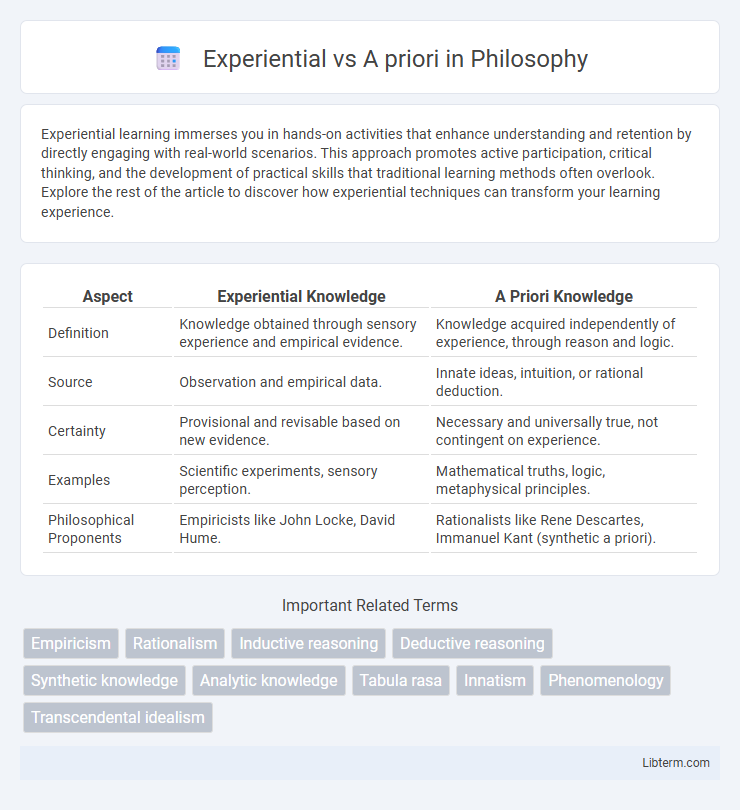Experiential learning immerses you in hands-on activities that enhance understanding and retention by directly engaging with real-world scenarios. This approach promotes active participation, critical thinking, and the development of practical skills that traditional learning methods often overlook. Explore the rest of the article to discover how experiential techniques can transform your learning experience.
Table of Comparison
| Aspect | Experiential Knowledge | A Priori Knowledge |
|---|---|---|
| Definition | Knowledge obtained through sensory experience and empirical evidence. | Knowledge acquired independently of experience, through reason and logic. |
| Source | Observation and empirical data. | Innate ideas, intuition, or rational deduction. |
| Certainty | Provisional and revisable based on new evidence. | Necessary and universally true, not contingent on experience. |
| Examples | Scientific experiments, sensory perception. | Mathematical truths, logic, metaphysical principles. |
| Philosophical Proponents | Empiricists like John Locke, David Hume. | Rationalists like Rene Descartes, Immanuel Kant (synthetic a priori). |
Defining Experiential Knowledge
Experiential knowledge is acquired through direct sensory experience and personal involvement, emphasizing practical understanding over theoretical concepts. It contrasts with a priori knowledge, which is obtained independently of experience through reasoning or innate ideas. This form of knowledge underpins skills and insights developed in real-world contexts, making it essential for applied learning and decision-making.
Understanding A Priori Knowledge
A priori knowledge consists of information known independently of experience, such as mathematical truths and logical deductions, which are universally necessary and certain. Understanding a priori knowledge involves recognizing its foundation in reasoning and innate concepts rather than sensory input or empirical evidence. This type of knowledge plays a crucial role in epistemology by providing a basis for assumptions that do not require validation through experience.
Key Differences Between Experiential and A Priori
Experiential knowledge derives from sensory experience and empirical evidence, while a priori knowledge is independent of experience and based on reason or logic. Experiential claims rely on observation and induction, whereas a priori propositions are established through deduction and innate understanding. The key difference lies in experiential knowledge's dependence on external data contrasted with a priori knowledge's foundation in inherent reasoning or conceptual analysis.
The Role of Experience in Knowledge Acquisition
Experiential knowledge is acquired through direct sensory interaction and observation, providing empirical evidence essential for validating hypotheses and refining concepts. A priori knowledge relies on logical deduction independent of sensory input, serving as a foundation for theoretical frameworks and mathematics. The interplay between experiential data and a priori reasoning enhances comprehensive understanding and robust knowledge acquisition.
The Significance of A Priori Reasoning
A priori reasoning, grounded in knowledge independent of sensory experience, establishes foundational truths essential for logic and mathematics. It enables the development of universal principles that guide empirical investigation and scientific methodology. This form of reasoning is significant because it provides certainty and necessity unattainable through experiential learning alone.
Examples of Experiential Knowledge in Everyday Life
Experiential knowledge is derived from direct experience and interaction with the world, such as learning to ride a bicycle through practice or understanding the taste of a specific cuisine by eating it. This contrasts with a priori knowledge, which is independent of experience, like mathematical truths or logical deductions. Everyday examples of experiential knowledge include mastering a musical instrument by repeated practice and developing social skills through personal relationships.
Classic Cases of A Priori Knowledge
Classic cases of a priori knowledge include mathematical truths like "2 + 2 = 4" and logical principles such as the law of non-contradiction, which are known independently of sensory experience. These examples demonstrate how a priori knowledge is derived from reason and intellectual intuition rather than empirical observation. Philosophers like Kant emphasize that a priori knowledge provides necessary and universal truths foundational to human understanding.
Philosophical Debates: Empiricism vs Rationalism
The philosophical debate between empiricism and rationalism centers on the sources of knowledge, contrasting experiential evidence gained through sensory experience with a priori knowledge derived from reason alone. Empiricists argue that all knowledge originates from empirical observation, emphasizing the role of experience in shaping understanding, while rationalists contend that certain concepts and truths exist independently of experience, accessible through innate reasoning. This discourse shapes foundational perspectives on epistemology, influencing how we validate truth and acquire knowledge.
Impacts on Science and Learning
Experiential knowledge, derived from sensory experience and experimentation, drives scientific discovery by providing empirical evidence that shapes hypotheses and theories. A priori knowledge, based on logical reasoning and innate concepts, establishes foundational principles and frameworks that guide scientific inquiry and critical thinking. The interplay between experiential data and a priori reasoning enhances learning processes by fostering both practical understanding and abstract comprehension in scientific disciplines.
Conclusion: Balancing Experience and Reason
Balancing experiential knowledge and a priori reasoning enhances decision-making by integrating empirical evidence with logical principles. Experiential learning provides concrete insights drawn from real-world interactions, while a priori knowledge offers foundational truths independent of observation. Combining both approaches fosters a comprehensive understanding that supports sound conclusions across diverse contexts.
Experiential Infographic

 libterm.com
libterm.com